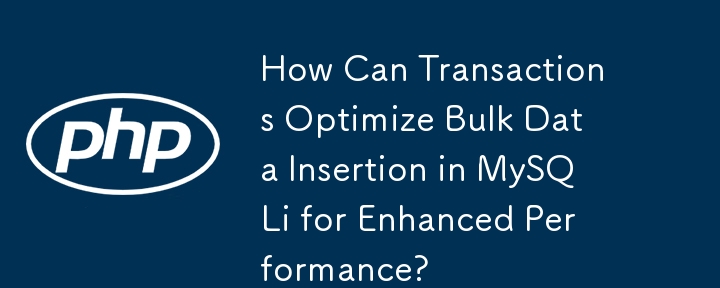

Bulk Data Insertion Techniques in MySQLi: A Performance Optimization
When faced with the task of inserting large volumes of data into a MySQL database, it's crucial to consider performance and security. While using prepared statements protects against SQL injections, a naive implementation with multiple queries can be inefficient.
Foregoing Single-Query Approach
Attempting to insert all values at once using a single query, while tempting for performance, can lead to stack overflows. The solution lies in optimizing the process while maintaining security.
Transaction-Based Approach
To significantly enhance performance, enclose the insertions within a transaction. This allows multiple inserts to be treated as a single unit of work, avoiding costly roundtrips to the database.
Code Optimization
The following code snippet illustrates the optimized approach:
$array = ["array", "with", "about", "2000", "values"];
$query = "INSERT INTO table (link) VALUES (?)";
$stmt = $mysqli->prepare($query);
$stmt->bind_param("s", $one);
$mysqli->query("START TRANSACTION");
foreach ($array as $one) {
$stmt->execute();
}
$stmt->close();
$mysqli->query("COMMIT");Benchmarking Results
Benchmarking tests with 10,000 iterations revealed a substantial performance improvement:
This translates to a remarkable two-order-of-magnitude speed increase, demonstrating the effectiveness of the transaction-based approach.
The above is the detailed content of How Can Transactions Optimize Bulk Data Insertion in MySQLi for Enhanced Performance?. For more information, please follow other related articles on the PHP Chinese website!
 What is the reason for failure to connect to the server?
What is the reason for failure to connect to the server?
 How to turn off the firewall
How to turn off the firewall
 How to solve the problem that suddenly all folders cannot be opened in win10
How to solve the problem that suddenly all folders cannot be opened in win10
 Solution to missing xlive.dll
Solution to missing xlive.dll
 What is the transfer limit of Alipay?
What is the transfer limit of Alipay?
 How to buy Bitcoin
How to buy Bitcoin
 parseint function usage
parseint function usage
 Solution to phpstudy3306 port being occupied
Solution to phpstudy3306 port being occupied




